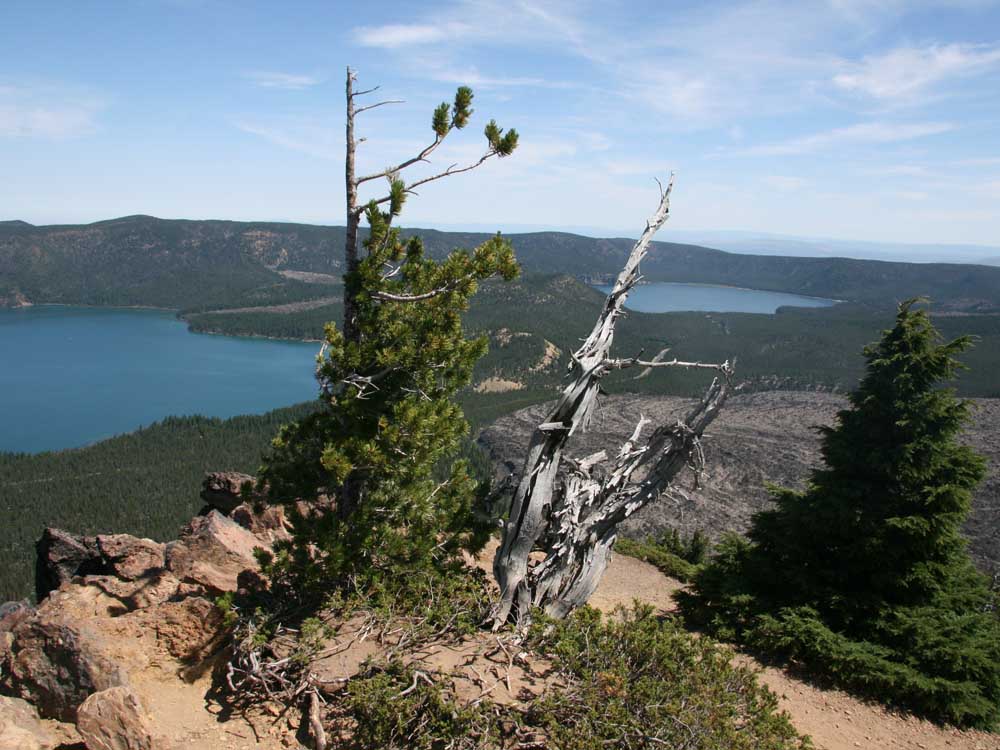East Lake Resort is turning 100
Published 12:00 am Saturday, August 1, 2015

- Photo by Will Rubin/ The BulletinPaulina Lake (left) and East Lake from the top of Paulina Peak.
Long before Bend became a booming area for urban growth and prior to the height of Central Oregon’s timber industry, a small health facility opened in the heart of Newberry Crater.
A full century later, East Lake Resort remains an oasis hidden deep within rolling terrain created by long-cratered Newberry Volcano.
“There’s something about the place that really drives people to be kinder than they normally would be,” said Danny Lippis, who first visited East Lake in 2009. People walk slower, take their time, there’s that calm vibe throughout the whole resort.”
East Lake Resort is 45 miles southeast of Bend within the Newberry National Volcanic Monument. Being off the beaten path, the resort offers visitors a measure of peaceful solitude unavailable in much of today’s frenzied world.
Being at East Lake is like stepping into a post-World War II pin-up ad. The restored 1950s-era cabins are bursting with rustic charm, and the main lodge has a general-store feel.
The resort boasts a 1,050-acre lake stocked with brown trout, Kokanee and rainbow trout located at 6,400 feet elevation. Visitors can stay in cabins, park in an RV site or camp out.
The majority of the cabins have been renovated to modernize roofing and flooring while keeping the look true to the era in which they were first built.
Finding a balance between livable and rustic is a fine line to walk, says co-owner Bruce Bronson. But very few people turn around and leave when confronted with the pseudo-spartan conditions.
“It’s an off-the-grid experience, and a lot of people like that,” said Bronson, who partnered with life-long friends Rob and Sandy Morrison to buy the resort in March 2014.
Given East Lake’s pre-wireless enchantment, it’s no surprise that family reunions have long been a staple. Visitors often create happy memories that are remembered into their waning years.
Former owner Gary Hill had such a bond with the lake, he decided to buy it when it went up for sale in 1996.
Hill’s father made his first trip to the lake in 1923 and made return trips for nearly eight decades; many with his family in tow. As Gary tells it, the first dock went in at the resort because his dad wouldn’t have been able to get in or out of a boat without one.
Five years of ownership gifted Hill with a lifetime of stories about the area and those who visited. As Hill recently sat on the resort restaurant patio, he held the table rapt with the oddities he saw while in charge.
“There was this one family who came out every year with like six generations,” he began, leaning back in his chair. “They stayed in the same cabin every year and it had this garish picture of some skyline in it. Well, we renovated that cabin one year and when they came back, they were furious to find the picture gone; they had six generations of pictures in front of it!”
The throwback living quarters are just one of the ways in which East Lake has stayed unique for 100 years. The resort makes a living by attracting families and fishermen alike despite a lack of inflowing waterways.
So how did a body of water with no way in or out become a premier fishing destination in the Northwest?
Back in 1912, the Oregon Game Commission shipped containers of small red fingerling trout to Bend. Those fish were then routed an hour south and split between the two bodies of water within the Newberry Caldera: East Lake and nearby Paulina Lake.
Today, those lakes are two of the most popular fishing destinations in Central Oregon.
The former’s allure took hold more than 50 years ago when a teenage Jim Teeny developed a new kind of fishing fly to better help him catch fish near the shore.
The Teeny Nymph is among the most popular flies worldwide and is responsible for more than 30 International Game Fish Association records, according to the association’s data.
“East Lake is one of the most beautiful lakes we have in Oregon,” Teeny said. “From my first cast at East Lake on the north side, I kept the fly a secret for nine years. I wouldn’t even tell the owners how I caught those fish.”
Teeny’s legacy can still be felt at the resort via his flies for sale in the store, and the hordes of fishermen who use them still today.
Brian Wildish works as a pre-construction manager in Portland and is an administrator of a blog devoted to fishing for trophy-sized trout around Oregon.
“Compared to all the other lakes in Oregon or places I’ve caught (brown trout), I swear to god, they’re just some of the most beautiful ones I’ve ever caught,” Wildish said.
Wildish and his family have made the trip from Canby for nearly a decade; a tradition that started when he and his friend Ryan McDaniels took their fathers on a weekend fishing trip.
Now Wildish brings his wife and three kids — all under 10 years old — to the lake each summer, including for a week last month. Before they could even get the car unloaded, his 5-year-old son was itching to get on the water.
“The first thing my son said when we got there is ‘can we go fishing?’ Can we make S’mores?’” Wildish said. “There are people who would kill to have their sons and daughters say things like that, and mine are all about it.”
They went out at 5 a.m. more than once that week. Wildish was blown away that his little boy not only wanted to go out that early, but that experiencing the pre-dawn cold didn’t keep him from coming back.
It’s a dream of many a parent nowadays to see their children put down their iPhones and tablet computers; to see them step away from the screens and amuse themselves with batteries not included.
By the same token, the lack of cellphone service and other modern means of communication with the outside world is a draw for those who remember a time without them.
Satellite televisions were available for rent in the 1960s, but nobody used them and they were no longer available after just a couple of years.
Bronson and Morrison have debated adding amenities like wireless Internet or air conditioning to the resort. Nothing ever seems to materialize, though, and why would it?
If what worked 100 years ago is still appealing today, the owners aren’t feeling an urgent need to make changes.
— Reporter: 541-382-1811, wrubin@bendbulletin.com






